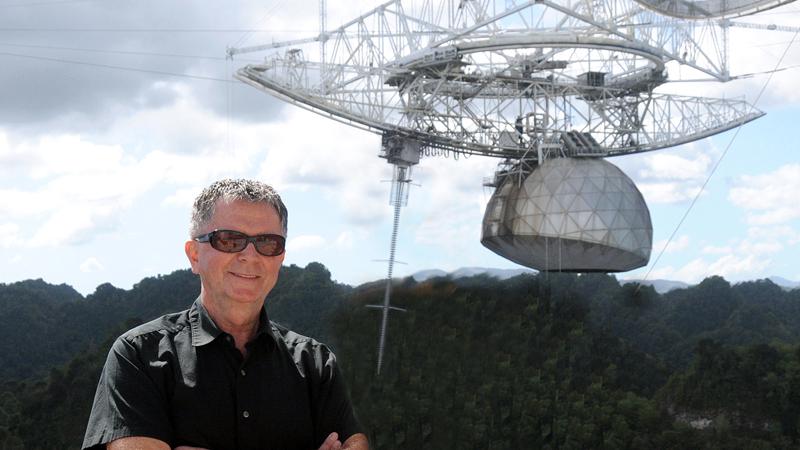
UNIVERSITY PARK, Pa. — Alexander Wolszczan, Evan Pugh Professor of Astronomy and Astrophysics, has been honored by Penn State with the title of Atherton Professor, effective Jan. 1, 2024, on his retirement. The University created the Atherton Professorship to recognize the continuing high level of scholarly or creative activity Evan Pugh University Professors may pursue after their retirement.
“Alex has made a huge impact on astronomy, including by discovering the first exoplanets, which are planets outside of our solar system,” said Tracy Langkilde, Verne M. Willaman Dean of the Eberly College of Science. “This is a tremendous accomplishment, and I am delighted that he will continue his robust research program at Penn State as an Atherton Professor.”
The Evan Pugh University Professorship is the highest distinction bestowed upon faculty by Penn State. Since the establishment of the designation in 1960, only 79 faculty members have been named as Evan Pugh Professors. The Atherton Professorship recognizes emeritus Evan Pugh Professors for their exceptional record of research and creative accomplishment, teaching and learning, and service over the course of their careers, and allows for the continuation of these activities to the benefit of the University community.
“Alex is an outstanding member of our department with a long history of impactful research, excellent teaching, and substantial service within the department and college,” said Randall McEntaffer, head of the Department of Astronomy and Astrophysics. “I am glad that we will be able to continue supporting the exciting research that he has planned during his Atherton Professorship.”
In 1992, Wolszczan became the first person to discover planets outside our solar system when he used the 1,000-foot Arecibo radio telescope to detect three planets orbiting a pulsar, which is a rapidly spinning neutron star. This discovery opened the door to the current era of planet hunting, and it catapulted the field of extrasolar-planet studies into the forefront of astrophysics. Since 2004, Wolszczan and his collaborators have discovered over two dozen massive planets orbiting red-giant stars using the Hobby-Eberly Telescope, an instrument for which Penn State is a major partner. He has also discovered and co-discovered many pulsars.
In 2017, Wolszczan was honored with the Bohdan Paczynski Medal by the Polish Astronomical Society — the organization of professional astronomers in Poland—for exceptional achievements in astronomy and astrophysics. In 2012, he received the National Geographic Traveler Grand Prix award for “overall achievement in travel, science or exploration along with the pursuit of a life-long passion” and he was named as the first recipient of the Frombork Gold Medal by the Gieysztor Academy of Humanities and the Cathedral Chapter of Warmia in Poland. In 2002, he was honored in Poland by having his likeness featured along with that of Nicolaus Copernicus on a special set of 16 postage stamps celebrating the Polish Millennium. Among Wolszczan’s many other honors are the 2001 Research Prize for Senior U.S. Scientists from the Alexander von Humboldt Foundation in Germany and the 1996 Beatrice M. Tinsley Award from the American Astronomical Society. In 1994, he received the “Best of What’s New” Grand Award from Popular Science magazine and the Penn State Faculty Scholar Medal for Outstanding Achievement.
Wolszczan is a corresponding member of the Polish Academy of Sciences, a legacy fellow of the American Astronomical Society, a member of the International Astronomical Union, and the International Union of Radio Science. He is an elected fellow of the American Association for the Advancement of Science and a fellow of the World Innovation Foundation.
Wolszczan earned a doctoral degree in physics in 1975 and a master’s degree in astronomy in 1969 at Nicolaus Copernicus University in Torun in Poland. He joined the Penn State faculty in 1992, was named an Evan Pugh University Professor in 1998, and became the founding director of the Penn State Center for Exoplanets and Habitable Worlds in 2008.
About the Atherton Professorship
The Atherton Professorship, under the sponsorship of the Office of the Provost and the administration of the Office of the Vice Provost for Faculty Affairs, invites applications for membership from Penn State Evan Pugh Professors who are retiring from the University and who wish to continue a high level of engagement as an emeritus faculty member.
Atherton Professors typically engage in the pursuit of scholarly or creative activities, leadership, or outreach in one or more of the following ways:
- Obtaining external funding to support ongoing research
- Current and future publications of research papers and/or books
- Leadership in learned societies and/or scholarly journals
- Solicited lectures, performances, or exhibits
Selection as an Atherton Professor is for an initial term of three years with the possibility of renewal. Atherton Professors may negotiate to receive support from their units such as funding, office space, or administrative support but do not retain any funding or privileges associated with their Evan Pugh University Professorship. Atherton Professors may petition the Graduate School to retain their graduate faculty status during the term of their appointment as an Atherton Professor.
